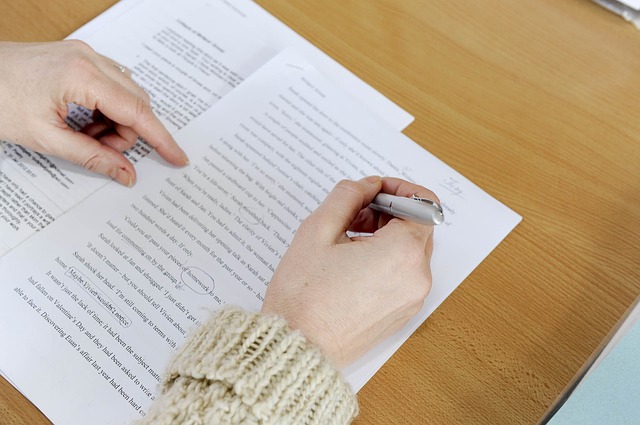As I mentioned in my recent post about the roles of agents and editors, some editors are in-house with a publishing company, while others work freelance. Freelance editors work with both first-time and previously published authors. Everyone can use a professional set of eyes on their work, regardless of their experience.
To provide a little more insight into the world of freelance editors, I’m pleased to bring you, Andrea Karin Nelson.
The Editor
Andrea Karin Nelson is a writer, editor, educator, theater artist and Sign Language interpreter. She is the founder and principal editor of Allegory Editing.
When she is not immersed in all things language and stories, she can be found cooking, gardening and practicing yoga. She makes her home in Seattle with her fantastic husband, their exuberant son and the family’s sweet-as-can-be cat.
The Interview
“I realized my skills and years of experience in those eclectic fields were something unique I could bring to the profession of editing.”
What led you to freelance editing?
Well, that is a bit of a long story! My path to freelance editing was circuitous, but every step of my journey led me here. I’ve spent my entire professional life in the business of language and stories.
I’m a theater maker (actor, playwright and teaching artist). Through that work, I tell my own stories and help others tell theirs. I’m a writer (novelist, short story writer and playwright). That work, of course, often goes hand-in-hand with professional editing.
I’m a Master-level Certified Sign Language Interpreter, which immerses me in the nuances of language and communication. Interpreters have to be keenly attuned not only to what is being said, but the how and why as well. I am a socio-linguistic nerd!
And I’m an educator. I’ve taught everything from conflict resolution in maximum security prisons to preschool drama classes and everything in between. My “teacher’s heart” deeply informs my work as an editor.
For years I traded critiques with writer friends. I loved it. I discovered I was good at it. One day I finally asked the question, “wait, do people actually do this as a job?” Turns out, yes!
As I looked into editing professionally, I realized my skills and years of experience in those eclectic fields were something unique I could bring to the profession of editing. It was a natural fit. I dove in and haven’t looked back since!
What exactly does a freelance editor do, and how is that important for a writer?
I am a developmental editor, which means I help writers develop and strengthen their manuscript (or short story or script) to get it ready for the next step. That next step could mean self publishing or submitting to publishers and agents to hopefully get picked up. I also work with writers who already have publishing deals but want another set of eyes on their draft before they send it to their publisher.
After reading the manuscript, I provide detailed feedback that the writer then incorporates into a rewrite. I provide a big picture analysis such as theme, plot, character development, and story arc as well as fine-tuning such as word choice, sentence structure and grammar. Whether I focus on big picture, fine-tuning, or both, depends on the needs of the particular project. The scope of my feedback is something the writer and I customize together before I begin work on their manuscript. I provide suggestions as to where I think we should focus, but it’s important my feedback serves the needs of the writer. Deciding how we will work together is ultimately a conversation.
Ghost editing lives somewhere in the intersection of developmental editing, project management and ghostwriting.
I also provide a more hands-on option I like to call “ghost editing”. This is a full service package that is most useful for nonfiction and memoirs. A ghost editing client is typically a person who is a thought leader in their field. They have expertise and wisdom they want to share, they have a compelling story, but have never written a book and need a highly guided approach. I work with these individuals every step of the way, from project conception to outlining, to writing coaching and even rewriting major sections of the book if needed. Ghost editing lives somewhere in the intersection of developmental editing, project management and ghostwriting.
What should a writer look for when finding a freelance editor?
It’s all about finding the editor who is the best fit for you and your work. A few questions that are helpful to ask when looking for that perfect match:
Do you get a good feeling about them? Do you like them? (This may sound irrelevant, but this is an important relationship. It works best if you feel positive about them. You cannot underestimate how important it is that you vibe well with your editor!)
Do you like their editing approach? Ask to see either a sample of an edit they’ve done for another author or a sample edit of your work—or both!
Is their correspondence professional and prompt? How an editor communicates with you when you first inquire about their services tells you a lot about how much care and attention they will put into their work with you.
Do they listen to what you have to say? Are they curious and respectful of you as a writer? Yes, the editor is the “expert,” but it is so important they meet you where you are and provide a service that is beneficial to you. Like I said, deciding how to work together is a conversation.
” …what’s most important is how they work with you.”
Recommendations are always helpful. If you don’t have any writers who can recommend an editor to you, look for editors who have blogs or social media accounts. This can be a good way to suss them out— to get a feel for their approach, see if you like them and trust their opinion. I do think it’s far less important you are impressed with an editor’s client roster. For one thing, they very well may not be able to disclose many of the writers they have worked with due to confidentiality agreements. Also, in the end, what’s most important is how they work with you.
Any red flags?
My hackles always go up when editors claim to be so good because they are so harsh—who criticize other editors for being too nice. Of course, we all want an editor who is going to be honest with us and not sugar coat things. But if you are good at what you do, you can give honest, valuable, constructive feedback without being a jerk! It takes a lot of vulnerability to put your creative work out there for feedback and I think it’s important to honor that. My opinion is, if you can’t give feedback with empathy, you aren’t very good at giving feedback.
Another red flag is if an editor tells you they can edit your entire, full-length manuscript for say, $50. You will find a range of prices and it’s totally okay to shop around. But if an editor is dramatically below the other quotes you are getting, I would question if they are going to really be able to put in the time it takes to do a good job.
Describe your process working with a writer.
First, I talk to a writer (either via email or by phone) and find out more about who they are as a writer and the project they are looking to have edited. This helps me get a feel for their goals and how I can best be of service toward those goals. During this time, I also tell a writer a bit about myself and how I approach the editing process. I also make a sample editorial letter available for them to look at to get a feel for my style. (The sample is also available for download on my website, www.allegoryediting.com)
 The next step is to do a (free) sample edit of their work. The writer sends me a short section of the piece they want edited and I do a critique of that section. I send the completed sample along with a price quote and service proposal.
The next step is to do a (free) sample edit of their work. The writer sends me a short section of the piece they want edited and I do a critique of that section. I send the completed sample along with a price quote and service proposal.
My pricing is customized based on how long a project will take. It’s a far bigger time commitment to edit a tome like War and Peace than a breezy beach romance, and my pricing reflects that.
Once I’ve been officially hired on for the project, I work with the writer to make sure that the goals and expectations for the edit are specific and mutually agreeable. Then I get to work!
My edits all come in writing via email. But the relationship doesn’t end the minute I hit “send” on the edit. Writers can always email me with questions that come up as they work through my edits and I encourage them to keep me posted on their progress!
How does your writing career augment your editing career and vice versa?
Not all developmental editors are writers, but many of us are. To be a skilled editor, you have to possess a way with words and a strong sense of how to craft a good story. A background in writing is a definite asset.
It’s also helpful to know where a writer is coming from. It gives me empathy about their process and helps me give feedback in a way that is most productive. I understand what it’s like to be on the other side of the equation.
My editing career has definitely informed and strengthened my writing career. It’s really honed my eye for my own work. I would say the one downside is that I have to actively turn off my editing eye sometimes, particularly when I am at the stage where I just need to write and get ideas on the page. When I need to flow, it’s important to just flow. I have to tell myself to keep going, get the scene written, get the chapter done and then put my editor cap back on and revisit what I just wrote with that editing eye.
How does your theater background relate to your writing and editing?
“…it’s all about telling stories…”
Theater is a truly collaborative art form, while writing is most often a solitary endeavor. Although I spend many hours alone at my laptop writing, I am a collaborator at heart. This comes out in both my editing and writing.
I actively seek out feedback on my writing. I have a longtime critique partner who sees all my work from its very infancy. I also adore writing challenges and competitions such as NYC Midnight and the like, that provide specific prompts and parameters for writers. While not technically collaborative, they are a great example of ways that writing can be a give and a take, a conversation between artists.
I am very comfortable giving and receiving feedback and very practiced at doing so in many different forms with many different individuals. It is inherent in the work of a theater artist. Especially in my background as an actor, I’m used to getting notes from a director. You have to take those notes, try not to let your feelings get involved and figure out how to incorporate them into your work in a way that feels authentic to you as an artist. Having done that for years in the theater makes receiving feedback as a writer and giving it as an editor feel very natural.
And in the end, it’s all about telling stories, no matter the medium. Whether on the stage or the page, the end goal is a good story!
How should writers contact you if they are interested? Do they need a “finished” manuscript? Do you offer sample critiques?
Writers do not need a finished manuscript. I meet a writer wherever they are in the process. I can read the first section and give feedback to help them shape the rest of the book. I can also do a partial edit of a section they are struggling with. Basically, if a writer needs editing or feedback or guidance, they should reach out and we’ll work together to figure out a package that works for them.
I do provide free, sample critiques. In fact, I prefer to do one, especially when I’m working with someone for the first time. The editing process can vary from editor to editor and project to project. The sample critique is a valuable part of how a writer and I establish a mutual understanding of our work together. Not to mention it’s a great way for a writer to figure out if I’m the right editor for them!
If a writer wants to contact me, I can be reached a couple different ways:
206-569-8544 (voice/text)
or by filling out the contact form on my website: www.allegoryediting.com
If a writer is interested in scoping me out beyond my website, they can subscribe to my weekly writing prompts and my writing tips newsletter. www.allegoryediting.com/subscribe
And of course, I can be found on Instagram, Twitter and Medium @AllegoryEditing
Great info, Andrea. Thanks for hanging out with us!


